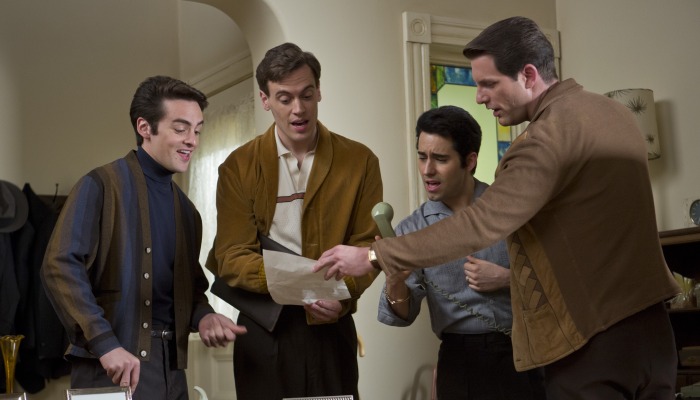Jukebox musicals are a dime a dozen, much like the machine from which they get their name.
Usually focusing on a single band or era of music, they used tried-and-tested narratives as a framework for the hits. Whether it’s Jim Broadbent smarming his way through “Like A Virgin” in Moulin Rouge or Meryl Streep’s recriminatory “Winner Takes it All” in Mama Mia!
Unlike those films, however, Jersey Boys is a biopic of the musicians whose discography it purloins, namely The Four Seasons. Opening with a Goodfellas-lite narration courtesy of lead guitarist and resident bad boy Tommy DeVito (Vincent Piazza), the film gives it to us plain: in New Jersey circa 1961, the only way out is to join the army, join the mob, or get famous.
It helps that Tommy has a friend in the form of Frankie Castelluccio (John Lloyd Young) whose angelic falsetto has made him a favorite of friendly neighborhood mob boss Gyp DeCarlo (a understated, scene-stealing Christopher Walken). Along with the slightly gormless Nick (Michael Lomeda) and the amiable, business-minded Bob (Erich Bergen), they become the band known to posterity.
With Clint Eastwood’s name on the marquee, Jersey Boys carries a certain cachet. The largely “unknown” cast come, in large, straight from the stage play and acquit themselves well. Their characterizations are limited – Tommy, roguish; Frankie, standoffish – but the film never loses sight of the business at hand: entertainment. In the case of a film like this, the style is the substance.
The band’s journey from rags to riches and towards eventual dissolution is hardly new, but writers Marshell Brickman and Rick Elice polish up the clichés and puts them through their paces. The musical set pieces are carried off with verve – their first performance of “Sherry” over the phone is electric – though the film’s few attempts at theatricality jar with its middle-of-the-road ambitions.
Eastwood’s direction is workmanlike, if unimaginative, full of lazy tracking shots. The terrible old age makeup in the film’s finale is reminiscent of Eastwood’s miscalculated J. Edgar, but there is very much the sense that this is work for hire, a far cry from the likes of Unforgiven or even Gran Torino. After forty years in the director’s chair, maybe the time for passion projects it over.
At best it can be said that the film doesn’t feel like a missed opportunity; despite the efforts of all involved, it was never bound for greatness. Howard Hawks said that a great film should have three great scenes and no bad ones. Jersey Boys has, perhaps, one great scene, a handful of good ones, and a couple of duds.
In that way it is, perhaps, true to the output of any artist. After all, they can’t all be classics.
